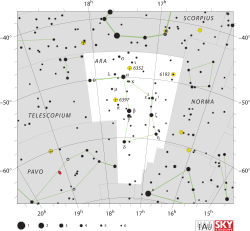Theta Arae
Theta Arae, Latinized from θ Arae, is the Bayer designation for a star in the constellation Ara. It has an apparent visual magnitude of +3.67,[2] which is bright enough to be seen with the naked eye. Based upon an annual parallax shift of 4.01 mas,[1] Theta Arae is 810 light-years (250 parsecs) distant from the Earth.
 | |
| Observation data Epoch J2000 Equinox J2000 | |
|---|---|
| Constellation | Ara |
| Right ascension | 18h 06m 37.87129s[1] |
| Declination | –50° 05′ 29.3125″[1] |
| Apparent magnitude (V) | +3.67[2] |
| Characteristics | |
| Spectral type | B2 Ib[3] |
| U−B color index | –0.870[2] |
| B−V color index | –0.109[2] |
| Astrometry | |
| Radial velocity (Rv) | +3.4[4] km/s |
| Proper motion (μ) | RA: –8.27[1] mas/yr Dec.: –8.70[1] mas/yr |
| Parallax (π) | 4.01 ± 0.15[1] mas |
| Distance | 810 ± 30 ly (249 ± 9 pc) |
| Absolute magnitude (MV) | −3.33[5] |
| Details | |
| Mass | 8.9 ± 0.1[6] M☉ |
| Radius | 20.1[7] R☉ |
| Luminosity | 3,450[5] L☉ |
| Surface gravity (log g) | 2.70[8] cgs |
| Temperature | 17,231 ± 231[7] K |
| Rotational velocity (v sin i) | 95[9] km/s |
| Age | 28.2 ± 4.7[6] Myr |
| Other designations | |
| Database references | |
| SIMBAD | data |
This is a supergiant star with a stellar classification of B2 Ib.[3] It has nearly nine[6] times the mass of the Sun and is over 20[7] times the Sun's radius. The outer atmosphere of this star has an effective temperature of 17,231 K;[7] much hotter than the surface of the Sun. At this heat, the star shines with the characteristic blue-white hue of a B-type star.[11]
References
- van Leeuwen, F. (November 2007), "Validation of the new Hipparcos reduction", Astronomy and Astrophysics, 474 (2): 653–664, arXiv:0708.1752, Bibcode:2007A&A...474..653V, doi:10.1051/0004-6361:20078357.
- Gutierrez-Moreno, Adelina; Moreno, Hugo (June 1968), "A photometric investigation of the Scorpio-Centaurus association", Astrophysical Journal Supplement, 15: 459, Bibcode:1968ApJS...15..459G, doi:10.1086/190168.
- Houk, Nancy (1978), Michigan catalogue of two-dimensional spectral types for the HD stars, 2, Ann Arbor: Dept. of Astronomy, University of Michigan, Bibcode:1978mcts.book.....H.
- Wielen, R.; et al. (1999), Sixth Catalogue of Fundamental Stars (FK6). Part I. Basic fundamental stars with direct solutions, Astronomisches Rechen-Institut Heidelberg, Bibcode:1999VeARI..35....1W.
- Anderson, E.; Francis, Ch. (2012), "XHIP: An extended hipparcos compilation", Astronomy Letters, 38 (5): 331, arXiv:1108.4971, Bibcode:2012AstL...38..331A, doi:10.1134/S1063773712050015.
- Tetzlaff, N.; Neuhäuser, R.; Hohle, M. M. (January 2011), "A catalogue of young runaway Hipparcos stars within 3 kpc from the Sun", Monthly Notices of the Royal Astronomical Society, 410 (1): 190–200, arXiv:1007.4883, Bibcode:2011MNRAS.410..190T, doi:10.1111/j.1365-2966.2010.17434.x.
- Underhill, A. B.; et al. (November 1979), "Effective temperatures, angular diameters, distances and linear radii for 160 O and B stars", Monthly Notices of the Royal Astronomical Society, 189: 601–605, Bibcode:1979MNRAS.189..601U, doi:10.1093/mnras/189.3.601.
- Fraser, M.; et al. (May 2010), "Atmospheric parameters and rotational velocities for a sample of Galactic B-type supergiants", Monthly Notices of the Royal Astronomical Society, 404 (3): 1306–1320, arXiv:1001.3337, Bibcode:2010MNRAS.404.1306F, doi:10.1111/j.1365-2966.2010.16392.x.
- Bernacca, P. L.; Perinotto, M. (1970), "A catalogue of stellar rotational velocities", Contributi Osservatorio Astronomico di Padova in Asiago, 239 (1), Bibcode:1970CoAsi.239....1B.
- "* tet Ara". SIMBAD. Centre de données astronomiques de Strasbourg. Retrieved 2010-07-30.
- "The Colour of Stars", Australia Telescope, Outreach and Education, Commonwealth Scientific and Industrial Research Organisation, December 21, 2004, retrieved 2012-01-16
External links
This article is issued from Wikipedia. The text is licensed under Creative Commons - Attribution - Sharealike. Additional terms may apply for the media files.